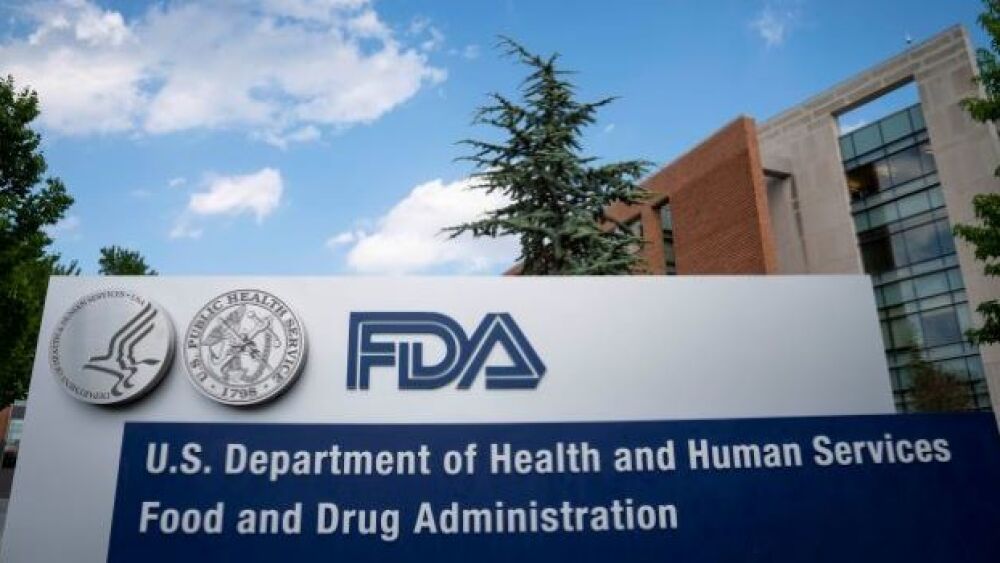The FDA has one target action date and one advisory committee meeting scheduled for this week. It is also gearing up for an adcomm that could prove to be pivotal for neurodegenerative diseases.
Pictured: FDA sign in front of building/Courtesy Sarah Silbiger/Getty Images
The FDA has one target action date and one advisory committee meeting scheduled for this week. It is also gearing up for an advisory committee meeting that could prove pivotal for the neurodegenerative disease space.
Apellis Seeks Approval for Empaveli Injector
On March 15, the FDA is set to decide on Apellis Pharmaceuticals’ supplemental New Drug Application (sNDA) for an injector of its paroxysmal nocturnal hemoglobinuria (PNH) drug Empaveli (pegcetacoplan).
The injector is a custom drug delivery system attached to the body, which would allow patients to self-administer subcutaneous infusions of Empaveli.
PNH is a rare disorder that arises from the uncontrolled activation of the immune system’s complement cascade, leading to the widespread destruction of red blood cells. Approved in May 2021, Empaveli is a complement inhibitor that treats PNH by targeting C3, the central cascade protein.
Empaveli is the first PNH therapeutic to target C3; others have focused on CD5, the terminal complement protein. Apellis’ drug is administered at 1,080-mg doses through a subcutaneous infusion twice a week, for which patients can use a commercially available pump.
Empaveli also comes with a boxed warning for meningococcal infections which “may become rapidly life-threatening or fatal if not recognized and treated early.” Patients on Empaveli may also be predisposed to serious infections, particularly by encapsulated bacteria.
Because of these risks, Empaveli is only accessible through a restricted program with a Risk Evaluation and Mitigation Strategy.
Adcomm Convenes for Pfizer’s Paxlovid
The FDA’s Antimicrobial Drugs Advisory Committee will meet on March 16 to discuss whether to grant full approval to Pfizer’s COVID-19 drug, Paxlovid (nirmatrelvir and ritonavir co-packaged tablets).
Pfizer is proposing Paxlovid to treat mild-to-moderate COVID-19 in adult patients who are likely to progress to severe disease, hospitalization or death. The regulator will publish pertinent background material for the meeting no later than two days before the panel convenes.
Paxlovid is an oral antiviral that combines the strong anti-coronavirus action of nirmatrelvir with ritonavir, which slows down the liver’s detoxification activity, allowing the drug’s effects to persist in the body for longer periods of time. Paxlovid has been authorized for emergency use for the treatment of mild-to-moderate COVID-19.
In June 2022, Pfizer submitted a New Drug Application seeking regular approval for Paxlovid for use in both vaccinated and unvaccinated individuals. The company touted data from the EPIC-HR study, which showed the drug cut the relative risk of hospitalizations and death from all causes by 86% relative to placebo.
In August 2022, the FDA asked Pfizer to also study the effect of an additional course of its coronavirus drug in patients with rebound infections.
On the Horizon: Biogen/Ionis Adcomm for Tofersen
The FDA is preparing for another advisory committee meeting that could hold significance in ALS and other neurodegenerative diseases.
On March 22, the Agency’s Peripheral and Central Nervous System Drugs Advisory Committee will convene to discuss Biogen’s NDA for tofersen for superoxide dismutase 1 (SOD1) ALS.
Tofersen was first discovered by Ionis Pharmaceuticals, from which Biogen licensed it under a 2018 agreement.
Tofersen is an investigational antisense oligonucleotide designed to treat ALS arising from mutations in the SOD1 gene. The therapeutic binds to SOD1 mRNA and tags it for destruction. In turn, this lowers the production of the faulty protein.
Biogen first submitted the NDA for tofersen in July 2022, largely based on its lowering of neurofilament levels. Neurofilament has been gaining traction as a biomarker in neurodegenerative diseases, and this adcomm will serve as a key test.
The FDA accepted and set an initial target action date for tofersen of Jan. 25, 2023. In October 2022, in response to additional data from Biogen, the FDA pushed back its goal date by three months to Apr 25, 2023.






